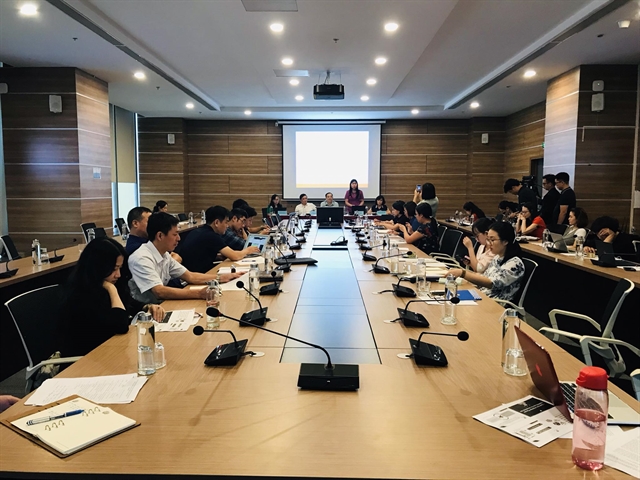 Society
Society

 |
| An overview of the conference. — VNS Photo Thu Trang |
HÀ NỘI — Despite much effort and achievement, protecting children in cyberspace still faces many difficulties, said Nguyễn Thị Nga, deputy director of the Child Affairs Department under the Ministry of Labour, Invalids and Social Affairs.
Speaking at a conference on human rights and foreign information, held by the Authority of Foreign Information Service under the Ministry of Information and Communications in Hà Nội on Thursday, Nga said that removing harmful content on the Internet faced many obstacles because some information came from foreign platforms.
Việt Nam has not established a child sexual abuse material (CSAM) database that includes information and descriptive data on images or videos of child abuse.
The country also lacks a mechanism for authorities, organisations, and businesses to participate in updating and analysing information to prevent the posting and sharing of images and videos of child abuse on the Internet.
She mentioned that at present, the main sources of receiving information about child abuse were through the hotline 111 and the website vn-cop.vn. However, both the website and hotline are often overloaded due to a shortage of personnel and technical equipment to store evidence and images and to connect internationally.
In the future, Nga said, State management agencies should continue to improve and supplement detailed legal regulations on child protection, data, and personal information regarding children's online protection.
The Ministry of Labour, Invalids and Social Affairs (MoLISA) and concerned agencies must pay special attention to establishing the CSAM database and will strengthen communication to raise awareness among children and parents about protecting children's privacy in cyberspace.
Media should exercise particular care in safeguarding the privacy and personal details of children when publishing news and articles about them, she said.
“Enterprises should promote the development of applications, software, online platforms, and games that serve as wholesome playgrounds for children, enabling them to interact healthily and creatively in cyberspace,” said Nga.
Children need to enhance their knowledge and skills to protect themselves and their personal information in cyberspace.
State management agencies will bolster inspection and inter-sectoral coordination to better protect children.
The National Child Protection Hotline 111 received more than 368,300 calls last year, a decrease of nearly 150,000 compared with 2021.
It has received nearly 220,000 calls so far this year.
In recent years, the legal system on child protection in cyberspace has been developed and augmented with a number of documents, laws, and policies.
Typical legal documents include the Resolution No. 121/2020/QH14 of the National Assembly on enhancing the effectiveness and efficiency of policies and laws on child abuse prevention and control; the Resolution No. 06/2019/NQ-HĐTP dated 1 October 2019, guiding trial organisation for sexual abuse cases involving individuals under 18 years old; and the Decree No. 27/2018/NĐ-CP on the management and use of Internet services and online information.
Việt Nam and the Southeast Asian (ASEAN) countries adopted the Declaration on the Protection of Children from All Forms of Online Exploitation and Abuse in ASEAN in 2019. Two years later, they adopted the Declaration on the Elimination of Bullying of Children in ASEAN, which includes provisions on bullying children in the online environment.
The network to rescue and protect children in the online environment was established in 2021, with the participation of 24 units, including State management agencies, social organisations, and businesses.
This network also aims to execute tasks related to preventing and combating child abuse in the online environment, increasing social awareness, and fostering a safe and healthy online space for children.
Last year, MoLISA trained 128 children across 12 provinces and cities in self-protection skills for the online environment. — VNS